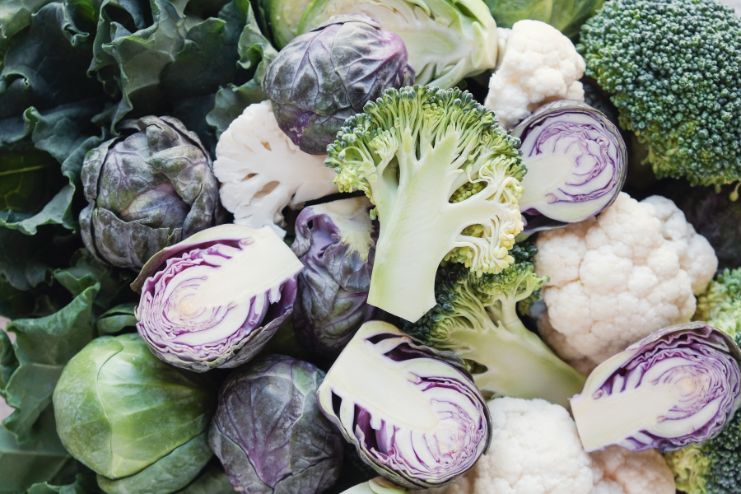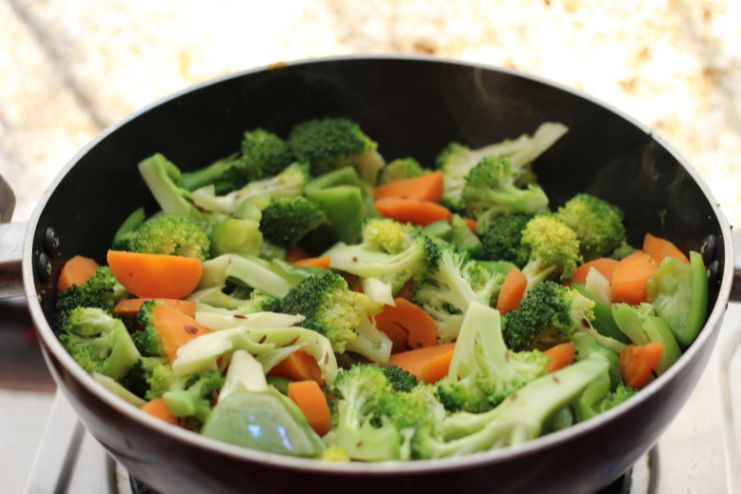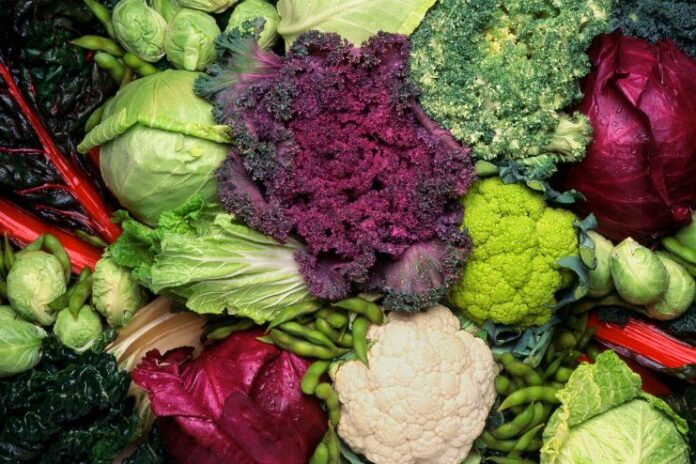Affiliate Disclaimer
Some links in this article are affiliate links. We may earn a small commission if you make a purchase through these links, at no extra cost to you. We only recommend products we find useful to our readersHave you ever experienced digestive issues even though you eat plenty of vegetables and healthy foods? We often assume that all vegetables are beneficial and can only improve our health. But have you ever considered blaming a vegetable for your digestive problems?
Do you wonder if all vegetables are equally good for our gut health and digestion? The answer isn’t a straightforward yes or no. Some vegetables can be quite difficult to digest, which may lead to gut issues and indigestion.
One group of vegetables that can cause these issues is cruciferous vegetables. Cruciferous vegetables, such as broccoli, cauliflower, Brussels sprouts, cabbage, and kale are very popular across the globe. They are loved for their high nutritional profiles and health benefits.
Cruciferous vegetables are packed with vitamins, minerals, and fiber. They help improve digestion, boost immune function, and lower the risk of chronic diseases. So, why do some people choose to avoid them? What are the reasons behind the debates about their benefits or potential harms? What are the alternatives and substitutes available? Should we really be avoiding these vegetables? We have the answers to all these questions.
For a few people, cruciferous vegetables can cause digestive discomfort. Let’s understand why this happens and find effective ways to prevent it. In this article, we will not only understand the side effects of cruciferous vegetables but also learn a few tips to include them in the diet seamlessly.
Read More: Lack Of Fruits And Vegetables In The Diet Can Impose Risks Of Heart Health
What Makes Cruciferous Vegetables Hard to Digest?

Cruciferous vegetables are widely known, not just for their nutritional benefits, but also for their digestive issues. Here’s why they are too hard to digest:
High Fiber Content: These vegetables are high in fiber, particularly insoluble fiber. This fiber content adds bulk to stool and helps in smooth and regular bowel movements. However, excessive fiber intake can lead to bloating and gas, especially for those who are new to a high-fiber diet.
Sulfur Compounds (Glucosinolates): Glucosinolates are sulfur compounds found in cruciferous vegetables. When we eat cruciferous vegetables, the glucosinolates are broken down by enzymes in the gut, including myrosinase, and bacteria in the large intestine. Thus, when metabolized during digestion, these enzymes may cause gas and bloating.
Raffinose and FODMAPs: Cruciferous vegetables also contain raffinose, a complex carbohydrate that is a FODMAP (fermentable oligosaccharides, disaccharides, monosaccharides, and polyols). FODMAPs may be hard to digest for some people and can cause bloating and digestive issues. They are poorly absorbed in the small intestine and fermented in the colon.
Thyroid Concerns – Goitrogens: Cruciferous vegetables such as broccoli, cauliflower, cabbage, and kale contain glucosinolates, which are metabolized into goitrogens when digested. Goitrogens can disturb thyroid hormone production by blocking iodine absorption. People with iodine deficiency or thyroid disorder must limit cruciferous vegetables as these affect hormone levels.
Gut Microbiome Differences: Gut bacteria differ from person to person. These differences can affect our ability to break down and digest certain vegetables and foods. This variation is due to lifestyle, genetics, and other factors. A gut with a less diverse microbiome might have difficulty breaking down specific compounds. This process leads people to feel gassy and bloated.
Read More: Sirtfoods: Can These Special Foods Turn on Your “Youth Genes”?
Who Is More Likely to Have Trouble Digesting Cruciferous Vegetables?
Certain people may experience more trouble digesting cruciferous vegetables. Here’s the list of people who must avoid these:
- People with Irritable Bowel Syndrome (IBS): People with IBS quickly react to whatever they consume. Individuals with IBS or weak digestive tracts cannot tolerate a high-fiber diet. Hence, these people must stay away from cruciferous vegetables for good.
- Those with Small Intestinal Bacterial Overgrowth (SIBO): SIBO is a disorder wherein the carbohydrates are highly fermented. This process can make us feel bloated and uncomfortable in the gut. Add cruciferous vegetables, which make it even more challenging to digest.
- Individuals with Thyroid Disorders: Cruciferous vegetables contain high levels of goitrogens, which can negatively affect thyroid function, especially in individuals who already have thyroid issues.
- People New to High-Fiber Diets: We all know fiber is good for the gut. However, a sudden high-fiber diet may overburden the system, causing gas and bloating. Fiber must be introduced gradually to help your body adapt to it.
Read More: SIBO vs. IBS: Understanding the Differences and How to Manage Them
How to Make Cruciferous Vegetables Easier to Digest

Cruciferous vegetables are tasty and healthy, so it becomes essential to find ways to include them in our diet without worry. To enjoy the benefits of cruciferous vegetables without discomfort, consider the following tips:
1. Change Your Cooking Technique:
How you cook cruciferous vegetables affects their digestibility and nutrient retention. Steaming, boiling, or roasting can soften fiber and sulfur compounds, making them easier to digest. Steaming and boiling are simple, while roasting enhances flavor and speeds digestion. However, overcooking can reduce water-soluble vitamins like vitamin C, destroy antioxidants, and deplete essential minerals.
Best Cooking Methods:
- Steaming retains nutrients, especially vitamin C.
- Light sautéing preserves vitamins.
- Microwaving on low heat minimizes nutrient loss.
Enjoy them both raw and cooked for maximum benefits. You can add them to salads, soups, stews, or smoothies. Frozen vegetables often retain more nutrients than fresh ones stored for long periods.
2. Consider Fermenting or Pickling:
Fermented foods are the gut’s best friends. This is because fermentation adds good bacteria that may help digest food and reduce gas-producing substances.Fermentation also promotes the growth of probiotics, the good bacteria. Probiotics not only improve digestion but also support immune function and promote heart health.
Read More: The Benefits of Adding Fermented Foods to Your Daily Meals
3. Use Digestion-Friendly Cooking Oils and Spices:
The cooking oils we use significantly affect digestion and gut health. Adding oils such as olive oil and spices like ginger may help with digestion and reduce bloating. Ginger contains an enzyme called zingibain, which improves digestion by breaking down proteins into smaller peptides. This makes it easier for the body to digest food, reducing gas and bloating.
So the next time you think twice before adding fresh broccoli or kale to your meals, all you need to do is change the cooking technique.
4. Practice Portion Control:
Portion sizes are equally important when we consume cruciferous vegetables. Pay attention to portion sizes to suit your body’s tolerance. Gradually increasing fiber intake allows your digestive system to adapt.
5. Pair with The Right Foods:
Pairing cruciferous vegetables with the right foods can enhance digestion and reduce discomfort. Add foods that contain digestive enzymes, such as lemon or apple cider vinegar, to promote digestion. Also, since cruciferous vegetables such as broccoli and kale contain fat-soluble vitamins A, D, E, and K, pair them with healthy fats like avocado or nuts to promote the absorption of these essential vitamins.
6. Utilizing Digestive Enzymes and Supplements:
Incorporating digestive enzymes and supplements can further support digestion. For instance, Betaine HCl helps increase stomach acid production, aiding the breakdown of tough-to-digest foods. Probiotics, which promote a healthy gut microbiome, can also improve digestion and reduce discomfort.
Read More: Digestive Enzymes vs. Probiotics: What’s the Difference and Which One Do You Need?
Should You Avoid Cruciferous Vegetables Altogether?

Most people enjoy cruciferous vegetables. While some may avoid them for health reasons, most others can safely enjoy their nutritional benefits.
Avoiding cruciferous vegetables might strip us of their high nutritional benefits. If they are to be avoided, opt for substitutes. Options like spinach, zucchini, and bell peppers are common alternatives to cruciferous vegetables. These vegetables provide similar nutritional benefits while keeping digestive issues at bay.
Conclusion:

If digestive issues have kept you from enjoying cruciferous vegetables, it’s time to rethink. While they can be hard to digest for some, there are plenty of ways to incorporate them into your diet without discomfort. Avoiding these nutritious vegetables isn’t necessary for everyone—understanding the causes of digestive issues and taking the right steps can make a big difference.
By using proper cooking techniques, moderating portion sizes, pairing them with the right foods, and considering digestive enzymes or supplements, you can easily include cruciferous vegetables in your meals. Remember, they can be a healthy addition for most people when prepared correctly.
Next time you’re shopping, don’t hesitate to grab that broccoli, Brussels sprouts, or cabbage. With the tips from this article, you can enjoy these vegetables without worry.
If you’re ready to add cruciferous vegetables to your diet, we hope this article has provided valuable insights. Listen to your body and make choices that work for you. We’d love to hear how these tips helped you—drop a comment below and share your experience!
References
- https://pmc.ncbi.nlm.nih.gov/articles/PMC7238915/
- https://pmc.ncbi.nlm.nih.gov/articles/PMC9017484/
- https://www.eatingwell.com/best-spice-to-reduce-bloating-8704521
- https://pmc.ncbi.nlm.nih.gov/articles/PMC6723656/
- https://pmc.ncbi.nlm.nih.gov/articles/PMC6723656/
- https://www.self.com/story/high-fiber-vegetables?
- https://pmc.ncbi.nlm.nih.gov/articles/PMC8575925/
In this Article
















